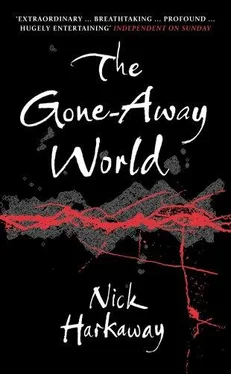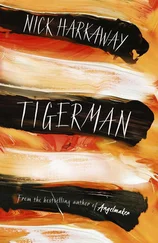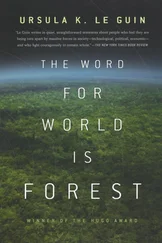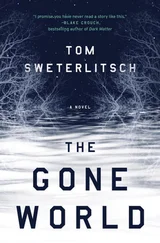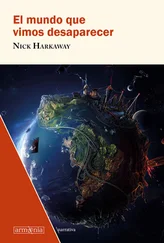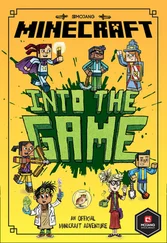Nick Harkaway - The Gone-Away World
Здесь есть возможность читать онлайн «Nick Harkaway - The Gone-Away World» весь текст электронной книги совершенно бесплатно (целиком полную версию без сокращений). В некоторых случаях можно слушать аудио, скачать через торрент в формате fb2 и присутствует краткое содержание. Жанр: Фантастика и фэнтези, Фэнтези, на английском языке. Описание произведения, (предисловие) а так же отзывы посетителей доступны на портале библиотеки ЛибКат.
- Название:The Gone-Away World
- Автор:
- Жанр:
- Год:неизвестен
- ISBN:нет данных
- Рейтинг книги:4 / 5. Голосов: 1
-
Избранное:Добавить в избранное
- Отзывы:
-
Ваша оценка:
- 80
- 1
- 2
- 3
- 4
- 5
The Gone-Away World: краткое содержание, описание и аннотация
Предлагаем к чтению аннотацию, описание, краткое содержание или предисловие (зависит от того, что написал сам автор книги «The Gone-Away World»). Если вы не нашли необходимую информацию о книге — напишите в комментариях, мы постараемся отыскать её.
The Gone-Away World — читать онлайн бесплатно полную книгу (весь текст) целиком
Ниже представлен текст книги, разбитый по страницам. Система сохранения места последней прочитанной страницы, позволяет с удобством читать онлайн бесплатно книгу «The Gone-Away World», без необходимости каждый раз заново искать на чём Вы остановились. Поставьте закладку, и сможете в любой момент перейти на страницу, на которой закончили чтение.
Интервал:
Закладка:
Jorgmund is like that. It is one thing, made from many. It does not think; it exists and it reacts and it expands, and that is all. The people who work for it are like the polyps, neither entirely individual nor entirely subsumed. They carry the monster in their minds, and they cannot see the whole. They give themselves to it, time-share, and slip into the body of the beast when they prefer not to be human. The ninjas are the stinging cells, reaching out and destroying enemies, killing food. Of all of them, Humbert Pestle is the greatest and the worst. He has made himself one with the machine, the monster. He sees it, and it does not appall him. He carries it in his head all the time, to the point where it is impossible to say whether he still exists separate from the thing.
I feel as if I have overturned a stone, expecting insects, and discovered that the stone itself is nothing but a vast mass of bugs.
. . .
IN ACTION MOVIES the hero can explain the danger in a few cogent sentences, and (aside from a token person who later gets eaten or has to apologise) everyone immediately accepts the reality of what he says and understands its significance. Monkey reflex is churning in me: flee, seek advantage, fight. Hit small, soft things with your hands. If you want to kill something big and tough, you need a stick with a rock on the end, or a sharp piece of bone. And I want to kill it, just as badly as it wants to kill me—or the Bey, or the Found Thousand, or anyone who sees it for what it is. Everything must function in a way which is compatible with Jorgmund. Anything which does not, may not persist. Evolution is not fuzzy or kind; DNA does not negotiate. This thing is like that: too basic, too young, too simple of its type to permit difference.
Elisabeth Soames does not quibble. She gauges me with rapid glances. She hears the words which do not come out, apprehends the ideas foaming behind them. She tosses our belongings into a bag, turns out the lights in the pigeon loft and unplugs the electric fire, then leads me rapidly away. She does not look back at the place which has been her home for twenty months or more. She does not allow herself to miss it. Her hand tightens in mine, just a little, as we drop down below the roof level, and we leave the cosy, ramshackle building behind.
WE TAKE the main road, along the Pipe. I drive. We have left the Magic of Andromas under wraps in Haviland. It is conspicuous where Annabelle is anonymous, just another big, creaky truck. If we are lucky, they believe I am dead. They won’t find my body, but there are many reasons why that might be so. Perhaps jackals have devoured me, or starving children of the street. Perhaps I rolled or crawled, broken, to the road, and was flattened by a succession of buses. Maybe—and I am particularly proud of this one—my body has been washed into a storm drain and is slowly leaching into the city’s water.
“No,” says Elisabeth Soames, as I continue in this vein, “enough. Enough and more than enough.” Because I have been sharing these brilliant thoughts with her for several hours, and she has winced and gagged her way through quite some few of them in that time.
Humbert Pestle’s file had a map. Quite close to Haviland, innocuous and ordinary, there’s a side turning which looks like a farm track. Turn down it and follow it, and the track becomes a lane, and then a wide, lazy road. The buildings are signposted as a synthetic milk plant. This is Jorgmund Actual, where FOX is made (I haven’t told Elisabeth yet what I know about that, the darkest of Humbert Pestle’s secrets, the black coffins burning at Station 9), and the Pipe begins and ends. The head and tail of the serpent. It is where the Bey will be. It is more than that. It is where I must go, where everything will finish.
For the moment, though, we need a place which is known, where we can meet our allies, such as they are, and if they come. So I have called Flynn the Barman’s private number and rented a room (something I have never dared to do before, lest I overhear him and Mrs. Flynn romping on the pool table or making whoopee in the master suite) at the Nameless Bar.
The desert is very much the same as it was. Deserts do change, of course. They go through subtle alterations, become more arid or more lush, favour one sly, pink-eared animal or another. It’s just very hard to tell. Deserts are like a nearly bald man having a haircut. The difference is absolutely crucial from within, but to the rest of us it’s still a dusty scrubland with little in the way of plant life. Tonight it’s cold. There’s a fine mist and a wind off the mountains which smells of snow. By contrast, the smell of pigs, warm and bilious, wafts along the road to greet us.
THE NAMELESS BAR is quiet. Not silent, but not loud. There’s no chatter of conversation, no sound of glasses being clinked. The windows are clear and bright through the mist, but there’s little sign of people passing in front of them. I wonder whether it is empty. We made our calls on the way, from a rest stop by the main Pipe. The bar should be full. If no one has come, then this is over before it begins. Elisabeth presses lightly against me. I am not alone. She at least is here, and going nowhere. Two against an army. Fine. Then the door opens, and there are Sally and Jim. Then they fall back a little, and a smaller woman steps between them: Leah.
I couldn’t ask the Free Company to come here. I couldn’t tell them what was going on and expect them to believe me. So I wasn’t going to. Elisabeth Soames is made of tougher stuff. She knew exactly how to make it happen, who would listen to me, who owed me and would feel it. She called Leah, told her who she was, and that she was with me, and what was happening and what Gonzo was really doing and how he’d been set up. For good measure she told Ma Lubitsch the same story, and Ma Lubitsch has a soft spot for Elisabeth Soames, who she considers to be, despite the evidence that Elisabeth is an itinerant magician-revenger who lives in a pigeon loft, “a nice young girl from Crick-elvud Cowff and very vell brought up. ” Ma Lubitsch bent Leah’s ear on one side and Elisabeth bent the other, and Old Man Lubitsch had to intervene so that Leah could say anything at all, and when she did it was very simple, and likely what she would have said before if she could have got a word in edgewise, which was: Yes.
So Sally and Jim were interrupted once again by visitors from our house—Gonzo’s house—though thankfully this time they were eating. Leah laid it out for them, and Jim rumbled and Sally stared, and then they got up and collected their emergency bags, the ones they have kept packed every day and night since Shangri-La, from just inside the bedroom door. Jim rubbed his bald, naked head and put a hat on, and all three of them went to round up Tommy Lapland and Samuel P., who were gadding about in some place very like Matchingham. These four dragged Tobemory Trent out of a wine-tasting, and Annie the Ox and Egon Schlender from a baby shower, and so it went on until they had the whole gang assembled and ready for the job at hand, although none of them knew precisely what that was.
Jim Hepsobah gives me a look from toe to top, and finds nothing to suggest that I am actually evil. If Leah trusts me; if Ma Lubitsch (who has had words with James V. Hepsobah on the subject of his tardiness regarding marriage) accepts me, that’s good enough for Jim. Sally is cooler. She is the backstop, the sniper, the plug-puller and the outer perimeter; being the deal-maker also makes her the deal-breaker in time of need. But even Sally nods to me shortly, and then the three of them bring me into the Nameless Bar, and I find myself in front of the people I know as well as I know anyone, and they have never met me before.
Читать дальшеИнтервал:
Закладка:
Похожие книги на «The Gone-Away World»
Представляем Вашему вниманию похожие книги на «The Gone-Away World» списком для выбора. Мы отобрали схожую по названию и смыслу литературу в надежде предоставить читателям больше вариантов отыскать новые, интересные, ещё непрочитанные произведения.
Обсуждение, отзывы о книге «The Gone-Away World» и просто собственные мнения читателей. Оставьте ваши комментарии, напишите, что Вы думаете о произведении, его смысле или главных героях. Укажите что конкретно понравилось, а что нет, и почему Вы так считаете.
